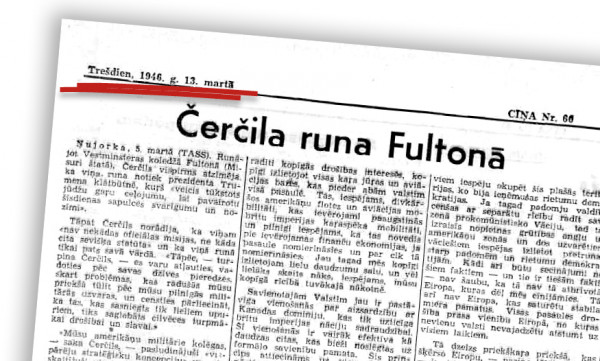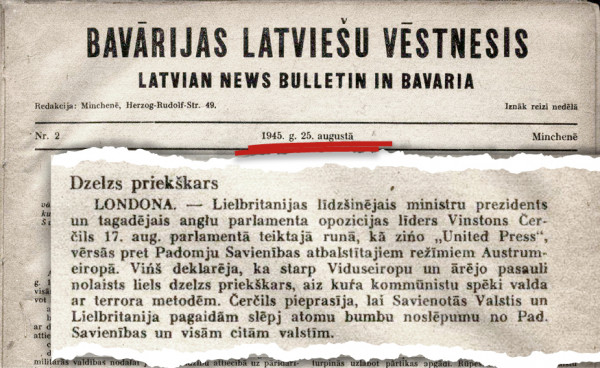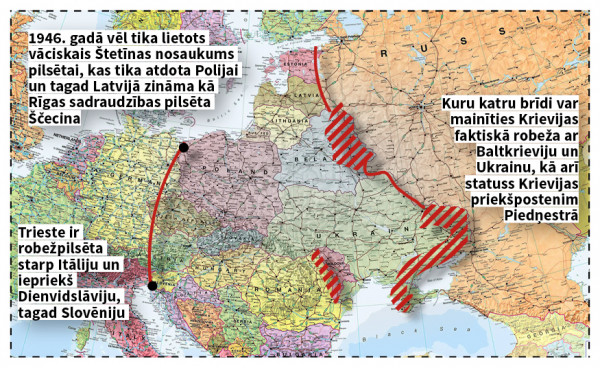Fulton speech by the politician and prophet Churchill
The iron curtain between Europe and Russia, which celebrated its 75th anniversary, has been moved to the east and fortified to withstand the blasts of infantry and low-power artillery shells on the front line between Russia and Ukraine.
These days mark 75 years since the words "iron curtain" became a world-famous concept after the March 5, 1946, speech by Winston Churchill (1874-1965) in Fulton, Missouri. On March 13, the Latvian newspaper Cīņa published a summary of this speech, prepared by the Soviet news agency TASS. Most of the publication is taken from quotations from Churchill's speech, including the part about the iron curtain: "From Stettin in the Baltic to Trieste in the Adriatic an "iron curtain" has descended across the continent."

Before that, the iron curtain in Latvian denoted theater equipment that would separate the stage from the auditorium in the event of a fire. At the end of World War II, these words were given a figurative meaning. First, Nazi propaganda published allegations in July 1944 in the newspapers Cēsis Vēstis and Kurzemes Vārds about the damage caused by the German F-1 missiles in England, which the British hid behind an "iron curtain" (in quotation marks). This was followed by W. Churchill's display for the Latvian audience as well. Already on August 25, 1945 - not 1946! -, the Bavārijas Latviešu Vēstnesis paraphrased and summarized W. Churchill's speech on August 17 in parliament, saying that "between the Central Europe and the outside world a large iron curtain has been lowered, behind which communist forces rule by methods of terror." The same person used the same words in the span of about eight months and had completely different effects.

Praise for Stalin and promises to Russia
March 13 was not the first retelling of W. Churchill's Fulton speech to Latvians. The fastest was in the German city of Kiel, which was separated by much fewer kilometers from Latvia than from Fulton, but which was on the same side of the Iron Curtain as Fulton. A Latvian refugee camp was also located in Kiel with its newspaper Nākotnes Ceļš, which already on March 9 quoted W. Churchill with the words that "From Stettin to Trieste an "iron curtain" has descended across the continent"; in addition, Nākotnes Ceļš had provided a map of Europe with a line showing the location of this curtain.
The significance of W. Churchill's speech is also emphasized by the fact that Cīņa printed almost the same article in two consecutive issues - on March 12 in the summary of the main newspaper of the Soviet Communist Party Pravda under the heading "Churchill threatens war" and on March 13 with a typical news headline, "Churchill's Speech in Fulton." In both cases, the same phrase "iron curtain" was used, but there were differences in interpretations of the speech.
W. Churchill's speech can indeed give different impressions. The speaker had put a lot of skill into it so that everyone could hear what they wanted to hear but still do what Churchill wanted.
It is not clear whether W. Churchill likes or dislikes the curtain. He does not like that because of the curtain "a shadow has fallen upon Europe, where the Allies so recently had their victory against Germany," but this did not prevent him from saying how "I have a strong admiration and regard for the valiant Russian people and for my wartime comrade, Marshal Stalin".
Turning from feelings to action, W. Churchill assured that
“There is deep sympathy and goodwill in Britain-and I doubt not here also-towards the peoples of all the Russias and a resolve to persevere through many differences and rebuffs in establishing lasting friendships. We understand the Russian need to be secure on her western frontiers by the removal of all possibility of German aggression. We welcome Russia to her rightful place among the leading nations of the world."
Due to such words, on the opposite side of the iron curtain, it was worth trying to do their best with the retelling of the speech of W. Churchill, prepared by TASS, translated into Latvian by Cīņa and reprinted by newspapers from several Latvian cities and counties. Thus, Latvians were not shown their place among other Russian peoples by local communists, but by a world-famous politician who has been known in Latvia since the founding of the country, and who has been mentioned by both Soviet and German war propaganda. Equally important here was Churchill's statement that "the Russian need to be secure on her western frontiers." So, they also have to feel secure in Latvia. This means that there will be no foreign intervention here, which many Latvians dreamed of. A significant number of them had fled to the forests at the time, and the Soviet authorities tried to get them out of the forests not only by siege and search but also by promises and explanations of why living legally was better than hiding. W. Churchill's words could be used as arguments that the Soviet power in Latvia is internationally recognized and that no attack threatens it.
With enough willpower, the recitation of W. Churchill's speech in Latvia could be understood in the opposite way. On August 27, 1946, the Jēkabpils newspaper Brīvā Daugava (Free Daugava, later Soviet Daugava for a long time) published a public denunciation about the prophet Marta, who "would have been laughable" if her "translation of Churchill's speech in Fulton had not been harmful. Miķiane's speculation is eagerly perceived by like-minded people and passed on, confusing gullible and unbalanced people.”
Nākotnes Ceļš paraphrases Churchill but shows that what he said was not faked by Soviet propagandists.
Application of iron and cement in geopolitics
W. Churchill attributes the properties of theatrical decorations to the iron curtain.
First, it covered the ways in which, in Soviet-occupied territories outside the Soviet Union, “control is enforced upon the common people by various kinds of all-embracing police governments. The power of the State is exercised without restraint, either by dictators or by compact oligarchies operating through a privileged party and a political police." By parties it is meant "Communist parties, which were very small in all these Eastern States of Europe," but because of the presence of the occupying forces of the USSR "have been raised to pre-eminence and power far beyond their numbers and are seeking everywhere to obtain totalitarian control."
Secondly, this cover is designed to look like iron, but still be light, i.e., easy to move even over huge distances around the globe: “However, in a great number of countries, far from the Russian frontiers and throughout the world, Communist fifth columns are established and work in complete unity and absolute obedience to the directions they receive from the Communist centre,” said Churchill. According to him, the Soviet Union desires "the indefinite expansion of their power and doctrines".
In that case, it turns out that it was not the Soviet Union or Stalin, but Churchill himself who wanted Europe to remain divided along the borders that were drawn with his participation in the meetings of the leaders of England, the United States and Russia (officially the USSR). "It is not our duty at this time when difficulties are so numerous to interfere forcibly in the internal affairs of countries which we have not conquered in war,” W. Churchill confirmed. In other words, it can be said that W. Churchill has wanted to cement the Iron Curtain and for a long time he succeeded.
The difference between Pravda's and TASS's interpretations of the same Churchill speech is that Pravda foresaw the failure of Churchill's plans, just as his party (because of him?) had failed in the July 1945 parliamentary elections, which deprived him of the post of prime minister. TASS interpreted these intentions as maintaining the boundaries and the balance of power that existed at the time, in a way that did exist for more than 40 years, or two generations of people. Pravda wrote about Churchill's plan to "establish an Anglo-American alliance that would ensure Anglo-American domination around the world, disband the coalition of the three great powers and thus the United Nations (UN), make power politics a dominant factor in world development."
In fact, Churchill, perhaps by blindly guessing and offering everything to make at least something of it happen, also suggested something that really happened.
Firstly, it is certainly not to dismantle the United Nations, but, on the contrary, to "put a certain number of aviation squadrons at its disposal" so that it is not destined for the fate of the completely weak League of Nations, which collapsed with the Second World War. Yes, some formations of troops with UN symbols can indeed be seen in TV reports from places where armed conflicts have erupted between countries, nations or religious denominations.
Second, to base the prevention of World War I on "what I have called the fraternal association of the English-speaking peoples." Yes, this has happened by including the Latvian nation in the Association of English-speaking nations, which is currently very clearly abandoning the Latvian language in favor of the English language. This renunciation was formalized in 2004 with Latvia's accession to NATO and the European Union, which had accepted English as the real language of communication a generation earlier.
No one now objects to Churchill Fulton's speech being the beginning of NATO, but it was built on recommendations and assumptions that did not require the exact signing of the treaty on mutual defense on 4 April 1949 by the countries that based their unity on the proximity to the Atlantic Ocean. Churchill's speech can be understood both as focused on the relations only between the USA and England, and as showing several directions of the expansion of these relations. He noted "special relationship between the British Commonwealth and Empire and the United States", mentioned that "there are already the special United States relations with Canada which I have just mentioned, and there are the special relations between the United States and the South American Republics," and so on.

W. Churchill searched and found the resources to stop the iron curtain from moving to the west and was able to witness the August 1961 decision of the German Communist leaders to materialize W. Churchill's words in the Berlin Wall through Berlin and all of Germany. Although the wall was not aimed at those who wanted to enter the communist part of Germany, at those who wanted to get out of it, it was a defensive structure made of cement. Such material confirmed that the expansion of communism had come to an end, at least in Europe. After almost 30 years of existence, the walls were dismantled and the iron curtain regained its movement, not to the west, but to the east to the current Russian border with its outposts in the occupied territories of Ukraine, Belarus and Transnistria.
*****
Be the first to read interesting news from Latvia and the world by joining our Telegram and Signal channels.
